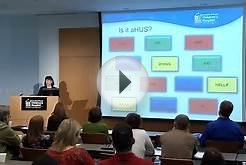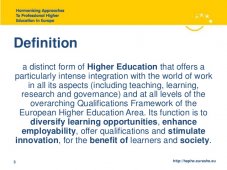| This brings to mind an observation by a former Nobel Prize winner in Literature, the Mexican writer Octavio Paz (1914-1998 ), that " the search for the future ends inevitably with the conquest of the past". May 68 marked, in Europe as in many other countries on other continents, the end of an era in which institutions of higher education, particularly universities, could allow themselves to be the exclusive preserve of the elite, and to deny priority consideration to the search for solutions to the pressing problems of society.
In recent times, changes have accelerated, and have become so numerous and diversified that even a definition of what higher education is has become an arduous task indeed. From a pragmatic point of view, we define as higher education all types of education (academic, professional, technical, artistic, pedagogical, long distance learning, etc..) provided by universities, technological institutes, teacher training colleges, etc..., which are normally intended for students having completed a secondary education, and whose educational objective is the acquisition of a title, a grade, certificate, or diploma of higher education. Within this very broad definition, the analysis of the evolution of higher education institutions, in the course of the past thirty years reveals that their basic mission remains and will remain attached to four principal goals: 1- The development of new knowledge ( the research function).
|
| IIII - NEW MISSIONS |
| The initial question therefore confronting the participants in the preliminary meetings of the World Conference was to determine how institutions must act, in the present world environment, to fulfil their missions.
Additionally, they also considered whether new missions should be added to the traditional ones, particularly in view of the fact that, over and above society's problems, higher education institutions are themselves facing radical internal changes related to an explosive equation produced by the growth of their population (students, teachers, administrators), the rise in costs and the reduction of public spending. As Federico Mayor pointed out in the preface of the Policy Paper for Change and Development in Higher Education (1995), "since its creation, UNESCO has never ceased to encourage the development of higher education and research ". It was a UNESCO publication, the World Survey of Education (Vol. IV- Higher Education) which asserted, in 1966, that the "second half of this century will remain in history as the time of an expansion of higher education surpassing, by far, all which has preceded it". This is confirmed today by one of the working papers of this conference : Higher Education in the World : Statistics 1980-1995 the figures of which have been quoted by the Prime Minister, Lionel Jospin, in his address at the opening of the World Conference, and which shows that in the course of the last decades, and on an international scale, the number of students registered in higher education institutions has undergone tremendous growth. "In 1960, world enrolment was only 13 million, in 1970, it was already 28 million, in 1980, the total stood at 51 million. There is every reason to predict that the current trend will continue and the world enrolment total will climb beyond the current, unprecedented total . |
| IV - UNIVERSAL ACCESS TO HIGHER EDUCATION |
|
Some countries, particularly those connected with OECD, are clearly stating their intentions to reach universal access to higher education (or tertiary education, as mentioned by OECD). In a more recent document (Redefining Tertiary Education, 1998, p.37) this organization indicates that: - "Tertiary education is becoming the place to be, the experience to have , prized and valued for all, not just a privileged minority. The direction is universal participation: 100 per cent participation, with fair and equal opportunities to study; in some form of tertiary education; at some stage in the life cycle and not necessarily end-on to secondary education... Access, therefore, is not merely to an institution but to a way of life, not for the few but for all. " - In the same publication and on the same page, the OECD mentions "the need for a new paradigm for tertiary education. Its elements include ... the direction of public policy in many countries which project eligibility for tertiary education of 60, 80 or 100 per cent of those completing secondary education; an, in the case of one (the United States) of entry into some kind of tertiary education by everyone... ". In 1968, French students were demanding on one of their posters at the Sorbonne, "Education in the service of the people" and were saying "no to the class-bound university" (Non à l'université de classe) . To what extent do the goals of universal access proposed by OECD - whose Member States include a large number of "soixante-huitards" within their governments - fulfil the wishes of the students of 1968 ? UNESCO's Policy Paper for Change and Development in Higher Education, 1995, reveals that the young people of the African region have 17 times less opportunity to pursue higher education than their counterparts in industrialized countries (for the totality of the developing countries, this opportunity is four times less on average.). |
You might also like:





|
FH6161267 NCAA Eastern Michigan Logo Vinyl Wall Graphic Decal Sticker Sports (Fathead)
|







